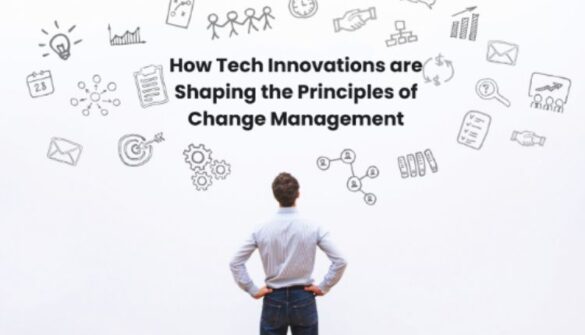needs, businesses in all sectors constantly implement new technology and procedures. The significance of good change management has been pushed to the fore by the rapid pace of modern life. What is interesting, however, is how technological advances are not just influencing the rate of change and the basic tenets of change management. This blog will explain the enormous effect technology has had on change management and why it is now more important than ever to take a Change Management Course and be prepared for Change Management Interview Questions.
Table of contents
- The Evolution of Change Management
- Digital Transformation
- Data-Driven Decision-Making
- Remote Work and Collaboration Tools
- Automation and Robotics
- Cybersecurity Concerns
- The Role of a Change Management Course
- Preparing for Change Management Interview Questions
- Conclusion
The Evolution of Change Management
It used to be that change management was simply a systematic plan for getting people, groups, and companies from where they are now to where they need to be in the future. Constant technological progress is a key factor in this shift. Some examples of how technological advances are influencing change management concepts are as follows:
Digital Transformation
Technology trends such as cloud computing, AI, and the Internet of Things (IoT) have made digital transformation necessary for modern enterprises. It usually necessitates a radical change in how things are done inside an organisation. Effective change management is essential for a trouble-free adaptation to new digital systems.
Data-Driven Decision-Making
The widespread availability of big data and analytics technologies has allowed businesses to make choices based on empirical evidence. Facilitating teams’ transition to data-driven processes and encouraging a data-literate culture are increasingly fundamental tenets of effective change management.
Remote Work and Collaboration Tools
Remote work and collaboration technologies were more widely used after the COVID-19 epidemic. Managing the transition to new functioning methods and making the most of these resources is crucial to change management.
Automation and Robotics
The way tasks are completed is evolving due to automation technology like robotic process automation (RPA). Employees will require change management support as they adjust to new automated processes.
Cybersecurity Concerns
Organisations need to take strong cybersecurity precautions as the frequency of cyberattacks rises. Compliance with security rules and training for staff on cybersecurity best practices are two outcomes of effective change management.
The Role of a Change Management Course
Change management experts need to learn new tricks as technology continues to disrupt the field’s foundational concepts. Several positive outcomes may result from taking a course in change management.
- The most recent developments in change management and the influence of technology are often discussed in courses. This guarantees that those in change management keep up with the latest developments.
- Strategies for dealing with digital transformation initiatives and the introduction of automation tools may be covered in such courses.
- Learning to successfully lead change efforts in today’s tech-savvy organisations is a major focus of change management courses.
- Real-world case studies that illustrate how organisations have handled change in a technological setting are often used in courses.
- You may improve your reputation and employment opportunities by earning a certification from one of the many available change management courses.
Preparing for Change Management Interview Questions
Candidates for change management jobs should also be ready to discuss technological obstacles if asked about them during interviews. The following are some examples of questions and advice for responding to them:
1.How do you plan to handle change management in the context of a digital transformation project?
Share your thoughts on how the digital transformation will affect your staff and the steps you will take to make the shift as painless as possible.
2.Tell me about a time when you used technology as part of a successful change management programme.
Give an example of how you used technology to promote change and describe the results you achieved.
3.How can you overcome internal opposition to new technologies?
Specify the methods you use to detect and counteract opposition, such as communication plans and the involvement of key stakeholders.
4.How can we guarantee that decisions made during change efforts are based on data, and what role does data play in change management?
Explain how you encourage data-driven decision-making among stakeholders and highlight the value of data in tracking the evolution of the transformation process.
5.How do you keep employees engaged and talking throughout change projects when they’re all working from home?
Share your plans for virtual participation, such as the software you’ll be using for teamwork and the channels of contact you’ll be using.
6.How do you make sure your staff is cyber-savvy as technologies evolve?
Describe how you plan to include cybersecurity awareness and training programmes into your overall change management strategy.
Conclusion
As new technologies emerge, the foundations of Project Management Courses change management shift, making it more important than ever for experts in this field to maintain a state of constant adaptation. Successful adaptation to change in today’s technology-driven workplaces may be achieved with the help of a course in change management. Your chances of being hired will increase if you study up on technology-related Change Management Interview Questions. Change management will remain essential for ensuring that businesses can successfully adapt to a constantly shifting technological and economic environment.

